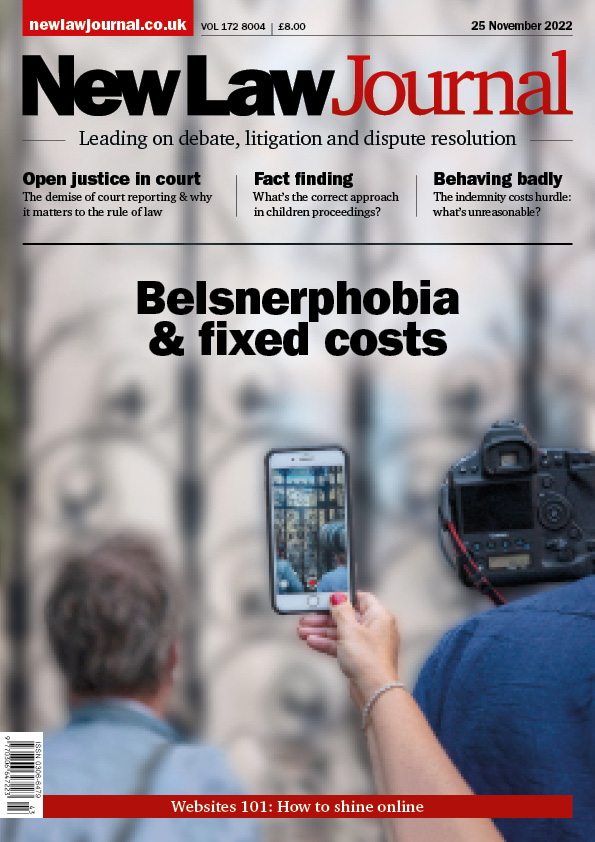THIS ISSUE

NLJ columnist Jon Robins takes a look in this week’s issue at the recent Justice Committee report, 'Open justice: court reporting in the digital age', which revealed troubling truths about accountability and transparency in the justice system.
How high a hurdle must be cleared before a court will grant indemnity costs on the basis of unreasonable conduct? Writing in this week’s NLJ, Masood Ahmed, University of Leicester and Lal Akhter, Med Chambers, Leicester, tackle this important question.
In the first of a two-part NLJ series on fact-finding hearings, Sarah Hughes, partner, and Victoria Rylatt, senior associate, Anthony Gold, look at some of this year’s key cases. These cases have grappled with difficult issues but provide extremely useful guidance, the authors write.
With economic storm clouds brewing, lawyers need to identify where they are exposed and how best to mitigate any weak spots.
With his front-row seat to the latest announcement on fixed costs, Professor Dominic Regan is well-placed to forecast what comes next, in this week’s NLJ.
Jon Robins charts the demise of media reporting from the courts & the impact on transparency in the justice system
Dominic Regan sees February and October in the fixed costs tea leaves, predicts Belsnerphobia in Wolverhampton, and shares the joy of swag
Sarah Hughes & Victoria Rylatt set out recent case law on fact-finding hearings in private children proceedings
How to tell who is telling the truth? Theo Huckle KC sets out some valuable guidance from the courts on assessing a witness’s honesty
Portal welcomes counsel; charity relaxations; Wales wins in extra time; Mostyn J overcomes authority; Parliament tough on CPR.
MOVERS & SHAKERS

Muckle LLP—Rachael Chapman
Sports, education and charities practice welcomes senior associate

Ellisons—Carla Jones
Partner and head of commercial litigation joins in Chelmsford
.tmb-mov69x69.jpg?sfvrsn=3d1684d4_1)
Freeths—Louise Mahon
Firm strengthens Glasgow corporate practice with partner hire
NEWS
One in five in-house lawyers suffer ‘high’ or ‘severe’ work-related stress, according to a report by global legal body, the Association of Corporate Counsel (ACC)
The Legal Ombudsman’s (LeO’s) plea for a budget increase has been rejected by the Law Society and accepted only ‘with reluctance’ by conveyancers
Overcrowded prisons, mental health hospitals and immigration centres are failing to meet international and domestic human rights standards, the National Preventive Mechanism (NPM) has warned
Two speedier and more streamlined qualification routes have been launched for probate and conveyancing professionals
Workplace stress was a contributing factor in almost one in eight cases before the employment tribunal last year, indicating its endemic grip on the UK workplace







